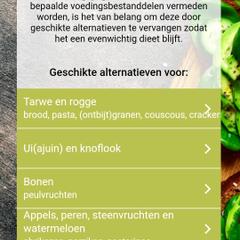For two years, a Leuven trial has been comparing patients that followed a simple irritable bowel syndrome diet via a new app with patients that took the classic medication for their problem. The DOMINO trial followed 470 patients that visited their GP for the first time for symptoms of the irritable bowel syndrome. Half of the patients were treated with a simplified low-fodmap diet, which either phased out or excludes certain food groups. They could follow this diet via an app, developed by the UZ Leuven dieticians. The other half of patients were treated with the classic medication for irritable bowel syndrome, the so-called spasmolytic drugs.
It is the first time that we can show that a diet is in fact more efficient than existing medication prof. dr. Jan Tack
prof. dr. Jan Tack
After a first follow-up visit to the GP after 8 weeks, both diet and medication gave good results. But the diet scored better than the medication: with medication, 62 per cent of the patients saw symptoms reduced or eliminated; with the diet this was 71 per cent. After 6 months nearly all patients were sufficiently motivated to continue the treatment, both with either medication (82 per cent) or with the diet (91 per cent).
Prof. dr. Jan Tack, gastroenterologist at UZ Leuven: “We were quite surprised about the good results. It is the first time that we've been able to run such a large trial on irritable bowel syndrome via the GP. The low-fodmap diet has been around for some time with specialised dieticians, but was not widely accessible for the public. We have made an app that is so simple that everyone can use it without any further explanation. Nearly all patients that followed the diet for the trial, continued to use is after the trial finished.”
Simplified low-fodmap diet
Scientific literature has previously shown that a low-fodmap diet with less hygroscopic or fermentable nutrients can reduce complaints related to irritable bowel syndrome. This diet, which was originally developed in Australia, an experienced dietician is required. Whoever follows this diet removes six big food types from their daily diet for six weeks. These include fructans, polyols, fructose or lactose. After six weeks, the dietician will assess whether the symptoms have improved, after which 1 food group can be added to the diet, to see what the effect is. The classic low-fodmap diet is an intense and time-consuming process, which requires an experienced diet professional.
The UZ Leuven dieticians developed a new app with a simplified fodmap-reducing diet, which includes clear lists that will tell you what you can and cannot eat. There are list of menus with substitute products and some 40 breakfasts, lunches, dinners, desserts and snacks. The trial showed that the diet does not have an influence on the patients' weight.
Prof. dr. Jan Tack: “It is the first time that we can show that a diet is more efficient than the existing medication. This does not mean that the app will work as well for everyone. If you have a busy international life, or often visit restaurants, you're probably better off with medication. And patients with serious and long-term complaints of the irritable bowel syndrome will of course still be referred to specialised dieticians. They can help with the more extended version of the low-fodmap diet.”
The app will be available as of June via the GP. Patients can use the app independently after a first diagnosis and assistance by the GP. The trial was funded by the Belgian Health Care Knowledge Centre (KCE).
The UZ Leuven dieticians developed an app with a simplified fodmap-reducing diet
In Belgium, 15% of the adult population suffers from irritable bowel syndrome making it one of the most frequent disorders in clinical practice. In GP's offices it constitutes 5% of all consultations. Patients are usually middle-aged and suffer from chronic stomach pain and a changing stool pattern without any identifiable cause. Complaints usually have annoying consequences for social life of people and reduces their quality of life.
About KCE Trials
KCE Trials is a funding programme for non-commercial clinical trials, financed by the Belgian federal government. These trials look at research questions that are generally not studied by the industry, despite their importance for society. The KCE is responsible for the selection and the financing of the clinical trials, but does carry out the trials. The responsibility for the coordination and the execution is taken on by the research teams in hospitals, unversities or non-commercial research organisations.
Symposium for GPs and other care providers
On Thursday 1 April, the UZ Leuven department for gastroenterology is organising a symposium to present the results of the trial. Registration for the symposium of 1 April (for GPs, internists, gastroenterologists, nurses internal medicine/gastroenterology/endoscopy and other that are interested) is free and can be done via this link: https://course.roulartahealthcare.be/rhc/thedominostudy